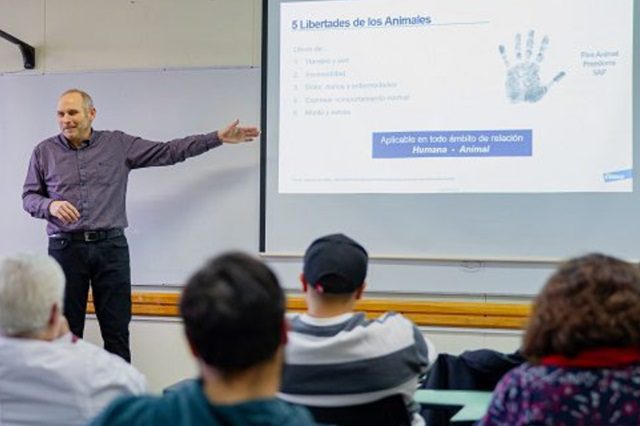BTN News: On Wednesday, July 3, Roberto Martin, the Animal Welfare Officer at Elanco Animal Health, led a workshop at the University of Magallanes (UMAG) in Punta Arenas. The event was titled “Animal Welfare in Research & Development and Generalities of Animal Welfare in Aquaculture.” It aimed to improve the bond between academia and industry. The focus was on the principles and practices of animal welfare in aquaculture and research.
This workshop was part of a collaboration between the Association of Salmon Producers of Magallanes and Elanco Animal Health. Many students and teachers from UMAG attended. Dr. Bibiana Jara, the head of the Department of Natural Sciences and Resources at UMAG, thanked Martin for his detailed talk. She said understanding and using animal welfare rules in research is important. It matters for both students and researchers.
“Knowing and using the rules for animal welfare in research is important for many careers and projects at the university,” Dr. Jara said. “This workshop drew a lot of interest and made students and teachers take part. Many students from the Faculty of Sciences and Health Sciences, as well as graduate students and researchers, attended.”
Roberto Martin said Elanco Animal Health is always ready to share knowledge with students, teachers, and future professionals. “We are always available to help with training in aquaculture, innovation, and science,” he said.
Animal Welfare Principles Explained in Detail
Martin talked about the guidelines of the World Organisation for Animal Health (WOAH) for the welfare of land animals. These rules include the five freedoms from 1965. These freedoms say what conditions animals should have when under human care. They should be free from hunger, thirst, fear, distress, physical discomfort, pain, injury, disease, and able to show normal behavior.
When it comes to fish, Martin talked about the WOAH’s standards for farmed fish. These rules are in the Aquatic Animal Health Code. They support handling methods that match the biological needs of fish and an environment that meets their needs.
Research and Development: The Importance of Ethical Practices
Martin said working with animals in research is a privilege. Society gives this privilege with the hope that research will lead to new and important knowledge. The results should improve the welfare of humans and animals. He stressed that research with animals must follow the 3Rs principle (Replace, Reduce, Refine). It should be done ethically and with care.
In Chile, there are no specific rules for using animals in science, research, and education. There are only general rules in animal protection laws (Law No. 20.380) and the penal code. There are also rules about responsible ownership, protected areas, hydrobiological species, and endangered species. Institutional Animal Care and Use Committees (IACUCs) review and approve research projects. They ensure ethical compliance and meet scientific publication standards set by the Ministry of Science, Technology, Knowledge, and Innovation. The National Research and Development Agency (ANID) also has Bioethical Guidelines for Animal Research.
Challenges and Solutions for Animal Welfare in Aquaculture
Talking about the challenges of checking fish welfare, Martin said there are many types of fish. It is hard to see fish underwater, and they do not make sounds or show facial expressions. Evaluations must rely on visible signs and indicators. But finding signs of low oxygen, pain, and stress in fish is often hard. Cold-blooded animals like fish do not have easy-to-measure signs like temperature, pulse, or breathing. The different environments and difficulty in standardization make it even harder.
Martin said the five freedoms also apply to fish farming. These involve high-quality diets, well-designed tanks or cages, the right water temperature and salinity, timely prevention, diagnosis, treatment, and stress reduction. Conditions for fish should be checked regularly, considering nutrition, density, management practices, and health. Other factors like temperature, salinity, oxygen levels, currents, and light should also be considered. Welfare indicators should be defined to evaluate the conditions provided.
In conclusion, Martin stressed the need to use animal welfare principles. These principles lead to improvements that focus on the needs of animals and respect for them. “Sustainable management involves good welfare practices and better conditions for farming fish. This leads to better efficiency, production, and added value,” he concluded.


